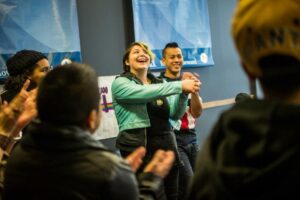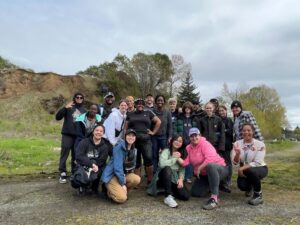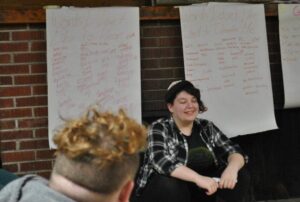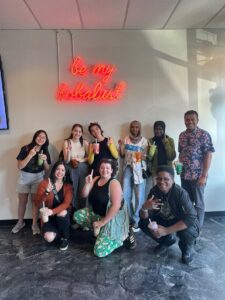June is Pride month and we asked several of our BELONG Partners colleagues in the LGBTQIA+ communities to share the stories of their experience as educators and what it means to them to be a queer role model in schools.

Thank you Lex Gavin for sharing this inspiring story of your work and journey!
Why do you work in education?
For me, it’s all about service to young people. Even when working with adult educators, it’s in service of young people. Education at its best is liberation and self-actualization. But our current education system isn’t focused on that, and instead really serves to teach youth to conform, or how to become a “productive” member of a messed-up society.
As an educator, I’ve spent most of my time outside the formal schoolhouse world—that’s where I learned the most, because school wasn’t a positive space in my life. I was a part of a queer youth program that really helped me understand myself and the world around me, and that invited me into very explicit social justice education. This counter-cultural learning space, which came out of the legacy of popular education, helped shape me in such a different way than my K-12 experience so I’ve always worked in youth programs versus in schools. Coming to BELONG Partners was a big shift for me, but I see it as an opportunity to bring a very different lens to an education system that needs a lot of heart, creativity, and imagination.

Did you have a queer elder to look up to as a youth?
I can’t remember having any queer elders to look up to in school, and I went to five different high schools. Even when I lived in Southern California, the only time I had teachers who were out as queer was when I went to an art school. My queer elders were the staff and volunteers at the queer youth program I attended.
I also feel like queer people have a very different understanding of what it means to be an elder. The AIDS epidemic robbed us of scores of people who would have become elders. When the average life expectancy of trans women of color in this country is 35 years old, it changes things. So, the people I looked up to were in their late 20s, early 30s, because they were who I saw reflecting my identity.

What does it mean to you to be a queer elder in a school space?
It means that sometimes I’m a mirror and a window. I exist as my full authentic self within a system that doesn’t leave a lot of room for that. So, to be visibly, vocally nonbinary shakes things up a little. I really really wish that this wasn’t the case, but that’s how things are right now. I am keenly aware that for youth and adults alike, I might be the first nonbinary person they form a relationship with. Also, parents of trans kids tend to gravitate towards me because I think in some ways, I’m a representative of a hopeful future for their loved ones.

I don’t wake up every day and plan to be a representative of my community, or to be a role model. I want to be a part of profound change, and to support young people in ways that I didn’t have, so I bring my whole personhood into my work—and my identities deeply inform how I look at the world. I’m not only those identities, I’m not in spite of or because of. Fundamentally, being a queer elder in a school space means working to challenge the status quo and build a better future. We’re here, we’re queer, we’re not going away, and we’re bringing everyone into new possibilities.
What’s one thing you did to celebrate Pride month this year?
I spent a lot of time at the beach soaking up the sun with a bunch of other queers!
